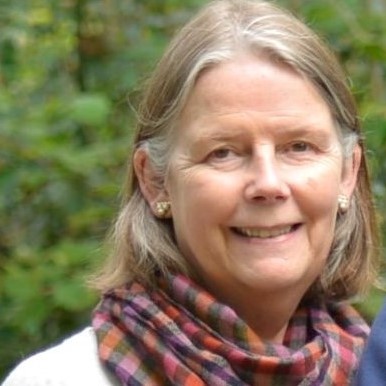
When Alison Yarrington was offered a place at Cambridge to complete a PhD in History of Art, her criteria for choosing a College all added up to one option.
“I didn’t want to go to a single sex College, and that was important to me having been at Reading University before Cambridge. There were comparatively few places for women in mixed Colleges in the early 70s, and when I looked at the intake Darwin came top. Also, I was very attracted to joining a graduate College – it’s something I thought would be very exciting, particularly as it was newly established.”
Darwin’s inclusive, interdisciplinary nature also served to confirm that she had made the right choice.
“What I was really drawn to was the idea of being with other researchers from a wide range of disciplines; and that the College was an international community, in its outlook and membership, opening up a window on the world.”
The first woman to serve as DCSA President, Alison lived in the Old Granary, which she remembers as being a delightful place, but often “freezing cold in the winter – I remember sleeping in a hat sometimes!”
She has fond recollections of her weekly meetings with the Master, Frank Young,
“He always took a keen interest in the DCSA and any issues we might have that he could help with. We often ended up talking about A.E. Houseman and The Shropshire Lad, poems which he enjoyed. He was and his wife Ruth Young were lovely and always around a lot; it was a sense of everyone being on your side that he did so much to foster.”
As part of the DCSA, Alison worked to enhance the support Darwin offered to students and members with young children.
“There were many with families and so creating a friendly and welcoming environment in College was essential; one small but significant indicator of this I think was always having highchairs available in the Dining Hall.”
She also recalls initiatives to encourage students to share their research in an informal context, the precursor to this year’s newly revived Chalk Talks.
“We held some informal lunches where we brought sandwiches and talked for five, ten minutes about our research and what we were doing. Everyone wanted to find out more about each other’s – often surprisingly similar – research questions and methodologies, always fascinating.”
Now Professor Emerita in Art History at Loughborough University, where she was formerly Dean of the School of the Arts, English and Drama, Alison has held senior posts at the universities of Leicester, Hull, and Glasgow, and is a Fellow of the Royal Society of Edinburgh. The welcome she felt at Darwin, and the security which came from knowing that staff, Fellows and fellow students valued each other and their contributions, is something she has tried to replicate throughout her own academic career.
“It was always interesting, it was stimulating, and it was fun – a very happy time.”
